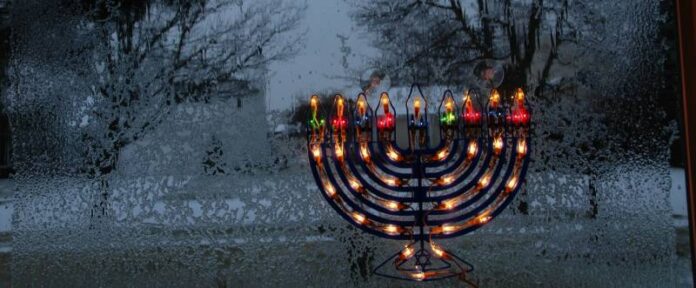
THE MIRACLE OF CHANUKAH
Chanukah is colourful, exciting, and popular, ranking with Purim in carnival spirit. Every type of talent is part of the festival: art, music, drama, cookery. The games are absorbing.
The songs centre on Ma’oz Tzur, with the debate as to whether the final stanza is authentic. There are many attempts to modernize the song with a new verse about the Holocaust and Israel.
The lights are lit, with the proponents of oil-lights ranged against those who prefer candles. The chanukiyyot come in a plethora of shapes. Some are elegant works of art; in the Bayswater Synagogue in London we had a dazzling display ranging from a chanukiyyah carved out of a potato, another made of bullet shells, a third built out of toy chairs. In the Hampstead Shule, our grand chanukiyyah was pressed into service one winter when we had an electricity blackout and the shule had no lights.
It wouldn’t do for a yom-tov to be without heroes and villains. There also must be miracles, but which miracles?
The Talmud asks in tractate Shabbat, “What is Chanukah (i.e. what is its main essence?)” There are different approaches in tractates Yoma and Shabbat. Yoma gives a nationalistic answer, highlighting the conclusion of the brilliant military campaign led by Judah the Maccabee against the Syrian Greeks.
Tractate Shabbat gives a spiritual, not a nationalistic explanation: “When the Hasmoneans became strong and overcame the enemy, they searched and could only find one bottle of oil with the seal of the high priest. It only contained enough oil for one day. A miracle occurred, and they lit the menorah with it for eight days.”
If the miracle was spiritual, why did the oil keep burning for eight days? These are some of the theories:
- Getting a fresh supply of oil took four days’ journey from Jerusalem, plus four days to return.
- The experts able to produce fresh oil had become ritually impure and had to wait for the defilement to end. They could then prepare the fresh oil on the eighth day.
- Seven days were needed to rebuild the altar and the sacred vessels of the sanctuary. Only then could the seventh day be devoted to preparing fresh oil.
- There were actually two miracles. One is the discovery of the one-day supply of oil; the second is the continuation of the day’s supply for a further week.
Rav Soloveitchik sees the festival as serving another purpose, the rededication of the altar.
If the main thing is the miracle of the oil, why do the Torah readings mark the dedication of the altar by the tribal princes? If the main thing is the oil for the menorah, we would read about the construction of the menorah. The texts imply that the oil-miracle was merely a stage in the rededication.
Rav Soloveitchik’s approach, like the story of the jar of oil, exemplifies the rabbinic insistence that there was a battle for the soul of the Jew. When challenges arise, what should a Jew think and feel, how does a Jew express Jewish identity?
The Jewish spiritual and cultural tradition must be preserved. If we focus on battles and not blessings, on fighting and not faith, a crucial dimension is missing.
A SHAMMASH IN THE AGE OF ELECTRICITY









